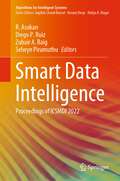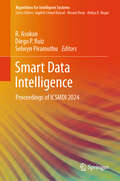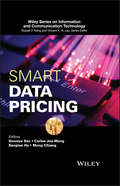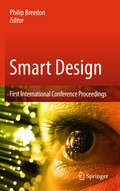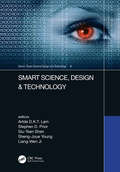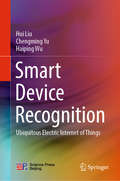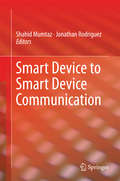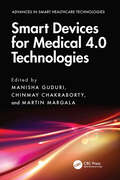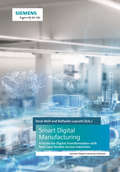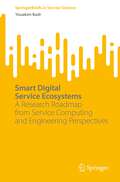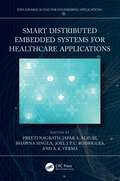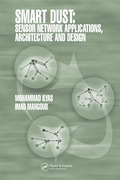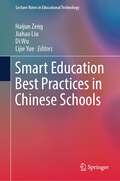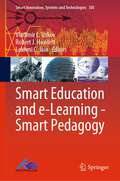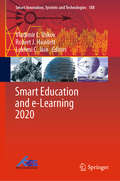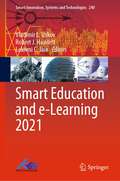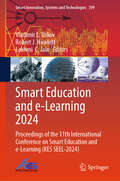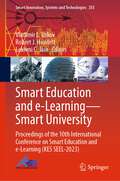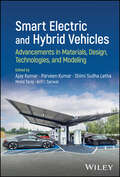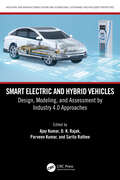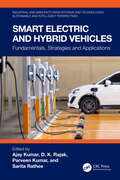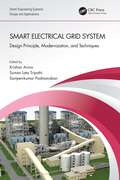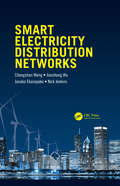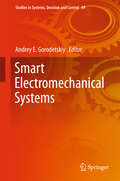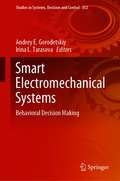- Table View
- List View
Smart Data Intelligence: Proceedings of ICSMDI 2022 (Algorithms for Intelligent Systems)
by Selwyn Piramuthu Zubair A. Baig R. Asokan Diego P. RuizThis book presents high-quality research papers presented at 2nd International Conference on Smart Data Intelligence (ICSMDI 2022) organized by Kongunadu College of Engineering and Technology at Trichy, Tamil Nadu, India, during April 2022. This book brings out the new advances and research results in the fields of algorithmic design, data analysis, and implementation on various real-time applications. It discusses many emerging related fields like big data, data science, artificial intelligence, machine learning, and deep learning which have deployed a paradigm shift in various data-driven approaches that tends to evolve new data-driven research opportunities in various influential domains like social networks, healthcare, information, and communication applications.
Smart Data Intelligence: Proceedings of ICSMDI 2024 (Algorithms for Intelligent Systems)
by Selwyn Piramuthu R. Asokan Diego P. RuizThis book presents high-quality research papers presented at 4th International Conference on Smart Data Intelligence (ICSMDI 2024) organized by Kongunadu College of Engineering and Technology at Trichy, Tamil Nadu, India, during February 2024. This book brings out the new advances and research results in the fields of algorithmic design, data analysis, and implementation on various real-time applications. It discusses many emerging related fields like big data, data science, artificial intelligence, machine learning, and deep learning which have deployed a paradigm shift in various data-driven approaches that tends to evolve new data-driven research opportunities in various influential domains like social networks, health care, information, and communication applications.
Smart Data Pricing
by Mung Chiang Carlee Joe-Wong Sangtae Ha Soumya SenA comprehensive text addressing the high demand for network, cloud, and content services through cutting-edge research on data pricing and business strategies Smart Data Pricing tackles the timely issue of surging demand for network, cloud, and content services and corresponding innovations in pricing these services to benefit consumers, operators, and content providers. The pricing of data traffic and other services is central to the core challenges of network monetization, growth sustainability, and bridging the digital divide. In this book, experts from both academia and industry discuss all aspects of smart data pricing research and development, including economic analyses, system development, user behavior evaluation, and business strategies. Smart Data Pricing: * Presents the analysis of leading researchers from industry and academia surrounding the pricing of network services and content. * Discusses current trends in mobile and wired data usage and their economic implications for content providers, network operators, end users, government regulators, and other players in the Internet ecosystem. * Includes new concepts and background technical knowledge that will help researchers and managers effectively monetize their networks and improve user quality-of-experience. * Provides cutting-edge research on business strategies and initiatives through a diverse collection of perspectives. * Combines academic and industry expertise from multiple disciplines and business organizations. The ideas and background of the technologies and economic principles discussed within these chapters are of real value to practitioners, researchers, and managers in identifying trends and deploying new pricing and network management technologies, and will help support managers in identifying new business directions and innovating solutions to challenging business problems.
Smart Design
by Philip BreedonGood product designs merge materials, technology and hardware into a unified user experience; one where the technology recedes into the background and people benefit from the capabilities and experiences available. By focusing on functional gain, critical awareness and emotive connection, even the most multifaceted and complex technology can be made to feel straightforward and become an integral part of daily life. Researchers, designers and developers must understand how to progress or appropriate the right technical and human knowledge to inform their innovations. The 1st International Smart Design conference provides a timely forum and brings together researchers and practitioners to discuss issues, identify challenges and future directions, and share their R&D findings and experiences in the areas of design, materials and technology. This proceedings of the 1st Smart Design conference held at Nottingham Trent University in November 2011 includes summaries of the talks given on topics ranging from intelligent textiles design to pharmaceutical packaging to the impact of social and emotional factors on design choices with the aim of informing and inspiring future application and development of smart design.
Smart Design, Science & Technology: Proceedings of the IEEE 6th International Conference on Applied System Innovation (ICASI 2020), November 5-8, 2020, Taitung, Taiwan (Smart Science, Design & Technology)
by Artde Donald Kin-Tak LamSmart Design, Science & Technology represents the proceedings of the IEEE 6th International Conference on Applied System Innovation (ICASI 2020), which was held in Taitung, Taiwan November 5-8, 2020. The conference received more than 200 submitted papers from at least 11 different countries, whereby roughly one third of these papers was selected by the committees and invited to present at ICASI 2020. This book aims to provide an integrated communication platform for researchers from a wide range of disciplines including information technology, communication science, applied mathematics, computer science, advanced material science, and engineering. Only high quality papers were allowed to publish in the volume. Hopefully, interdisciplinary collaborations between science and engineering technologists in academia and industry will be enhanced via this unique international network.
Smart Device Recognition: Ubiquitous Electric Internet of Things
by Hui Liu Chengming Yu Haiping WuThe book is the first international reference on the field of smart device recognition and Ubiquitous Electric Internet of Things (UEIOT). It presents a range of state-of-the-art key methods and applications for smart device recognition. In future smart environments, obtaining energy consumption information for identifying every device is an effective approach to guarantee the energy efficiency of smart industrial systems. Such as, the Ubiquitous Electric Internet of Things (UEIOT) technology represents one of the most effective measures for electricity and energy management and has attracted considerable attention from scientists and engineers around the world. The realization of smart device recognition in the UEIOT framework has become the core and basis of UEIOT’s success. The device smart recognition can help governments and managers to distribute energy and power better, and help device manufacturers to improve their products regarding smart energy conservation. Accordingly, in the future smart industry, implementing smart device recognition is desired and very important. In the book, several methods, strategies, and experiments for achieving smart device recognition are presented in details. As the first monograph in the field of smart device recognition, the book can provide beneficial reference for students, engineers, scientists, and managers in the fields of power, energy, electromechanical devices, smart cities, artificial intelligence, etc.
Smart Device to Smart Device Communication
by Jonathan Rodriguez Shahid MumtazThis book presents a comprehensive analysis of D2D communication over LTE-A band. The book uses 3GPP LTE-A as a baseline and explains all fundamental requirements for deploying D2D network under cellular systems from an architectural, technical and business point of view. The contributors explain the standardization activities of Release 12 of LTE-A, which has been recently acknowledged as support of D2D communication in LTE-A. The text updates the research community on the D2D roadmap as well as new features emerging for consideration in 3GPP.
Smart Devices for Medical 4.0 Technologies (Advances in Smart Healthcare Technologies)
by Martin Margala Chinmay Chakraborty Manisha GuduriThe aim of this book is to identify some of the challenges that need to be addressed to accelerate the deployment and adoption of smart health technologies for ubiquitous healthcare access especially in wearable devices. These wearable devices may include pacemakers, defibrillators, RFID devices, assistive devices for the visually impaired, magnifiers, and talking assistants. It also explores how Internet of Things (IoT) and big data technologies can be combined with these wearable devices to provide better healthcare solutions. Features: Focuses on real-time implementation of deep and machine learning techniques as well as novel algorithms for smart healthcare. Explores innovative challenges and solutions to complex problems in assistive devices with Medical 4.0 technologies. Presents an overview of challenges in the design of medical wearable devices. Discusses different techniques on VLSI for medical devices. Includes a case study on an AI-tuned cardiac pacemaker. This book is aimed at graduate students and researchers in biomedical, electrical, computer engineering, and medical technologies.
Smart Digital Manufacturing: A Guide for Digital Transformation with Real Case Studies Across Industries
by Rene WolfThe world progresses toward Industry 4.0, and manufacturers are challenged to successfully navigate this unique digital journey. To some, digitalization is a golden opportunity; to others, it is a necessary evil. But to optimist and pessimist alike, there is a widespread puzzlement over the practical details of digitalization. To many manufacturers, digital transformation is a vague and confusing concept they nevertheless must grapple with in order to survive the Fourth Industrial Revolution. The proliferation of digital manufacturing technologies adds to the confusion, leaving many manufacturers perplexed and unprepared, with little real insight into how emerging technologies can help them sustain a competitive edge in their markets. This book effectively conveys Siemens's knowledge and experience through a concept called "Smart Digital Manufacturing," a stepwise approach to realizing the promise of the Fourth Industrial Revolution. The Smart Digital Manufacturing roadmap provides guidance and enables low-risk, high-reward adoption of new manufacturing software technologies through a series of tipping-point investment decisions that result in optimized manufacturing performance. The book provides readers with a clear understanding of what digital technology has to offer them, and how and when to invest in these essential components of tomorrow?s factories. René Wolf is Senior Vice President of Manufacturing Operations Management Software for Siemens Digital Industries Software, a business unit of the Siemens Digital Factory Division. Raffaello Lepratti is Vice President of Business Development and Marketing for Siemens Digital Industries Software.
Smart Digital Service Ecosystems: A Research Roadmap from Service Computing and Engineering Perspectives (SpringerBriefs in Service Science)
by Youakim BadrThis book provides a holistic overview of the major advances that have been made in the context of Service Science with a focus on IT-enabled services. To address challenges in collaborative, social-centric, ad-hoc, dynamic and open environments, the book studies IT-enabled service systems from two distinct but complementary research perspectives: service engineering and service computing. From a service engineering view, the book shows how to apply a systemic approach to tackle social problems from holistic and multi-disciplinary perspectives by focusing on service systems and developing a service design framework, including socio-technical aspects, the service reference model, data-driven collaboration processes, the incremental design method, requirement propagation, and system adaptability with feedback loops. From a service computing view, the book introduces a service-oriented aided infrastructure to support IT-enabled service systems in ICT-facilitated environments and provide access to tangible and intangible resources in a trustworthy environment. The book offers a valuable companion and comprehensive reference guide for undergraduate and graduate students who want to learn about current concepts for designing and implementing service systems; and for researchers who want to identify future directions in build smart digital service ecosystems, integrating Internet of Things (IoT) and Artificial Intelligence (AI) and cyber-security. The book also appeals to developers who need to implement advanced services and want to capitalize on corresponding business models, customer-driven interaction, and scalable architectures.
Smart Distributed Embedded Systems for Healthcare Applications (Explainable AI (XAI) for Engineering Applications)
by Jafar A. Alzubi Joel J. P. C. Rodrigues Bhawna Singla Preeti Nagrath A. K. VermaThis book discusses the applications and optimization of emerging smart technologies in the field of healthcare. It further explains different modeling scenarios of the latest technologies in the healthcare system and compares the results to better understand the nature and progress of diseases in the human body, which would ultimately lead to early diagnosis and better treatment and cure of diseases with the help of distributed technology. Covers the implementation models using technologies such as artificial intelligence, machine learning, and deep learning with distributed systems for better diagnosis and treatment of diseases. Gives in-depth review of technological advancements like advanced sensing technologies such as plasmonic sensors, usage of RFIDs, and electronic diagnostic tools in the field of healthcare engineering. Discusses possibilities of augmented reality and virtual reality interventions for providing unique solutions in medical science, clinical research, psychology, and neurological disorders. Highlights the future challenges and risks involved in the application of smart technologies such as cloud computing, fog computing, IOT, and distributed computing in healthcare. Confers to utilize the AI and ML and associated aids in healthcare sectors in the post-Covid 19 period to revitalize the medical setup. Contributions included in the book will motivate technological developers and researchers to develop new algorithms and protocols in the healthcare field. It will serve as a vast platform for gaining knowledge regarding healthcare delivery, health- care management, healthcare in governance, and health monitoring approaches using distributed environments. It will serve as an ideal reference text for graduate students and researchers in diverse engineering fields including electrical, electronics and communication, computer, and biomedical fields.
Smart Dust: Sensor Network Applications, Architecture and Design
by Mohammad Ilyas Imad MahgoubSensor networks continue to grow in importance for modern communication networks. The fruit of recent efforts aimed at miniaturization and highly advanced functionality, smart dust sensor networks offer powerful, cost-effective solutions to densely distributed, high-resolution applications. In chapters carefully selected from the popular Handbook of Sensor Networks, Smart Dust: Sensor Network Applications, Architecture, and Design supplies a sharply focused reference on the applications, design, and performance of smart dust that is ideal for specialists in the field. Providing a succinct survey of the principles and technologies associated with smart dust networks, this book focuses on eight main areas: applications; architecture; protocols; tracking technologies; data gathering and processing; energy management; security, reliability, and fault tolerance; and performance and design aspects. Following a look at the opportunities and challenges facing the field, expert contributors authoritatively cover sensor network management, miniaturizing sensor networks with MEMS, sensor network architecture, energy-efficient technologies, positioning and tracking, comparison of cooperative computing in sensor networks, dynamic power management, low-power design for smart dust networks, and more.Smart Dust: Sensor Network Applications, Architecture, and Design details the applications and technologies that are at the frontier of modern sensor networks. It is an ideal reference for anyone interested in designing, planning, or building emerging sensor and communications networks.
Smart Education Best Practices in Chinese Schools (Lecture Notes in Educational Technology)
by Di Wu Haijun Zeng Jiahao Liu Lijie YueThis book presents 28 practical case studies in detail and 49 case studies in brief. The collection of these case studies focuses on one or more aspects of exploration and practice on the following topics: smart campus and smart classroom, resource construction and sharing, new teaching mode, comprehensive quality evaluation of students, teacher professional development, application of teaching platform and tool, innovative application of online learning space, collaborative education, and school management and services. The selection and evaluation criteria of the case studies on school practice mainly include concept and implementation, effectiveness and characteristics, innovation and demonstration, and expression and structure. This book helps readers gain a rich understanding of the diverse innovative implementation of smart education in Chinese schools and inspires smart education development in schools in other countries.
Smart Education and e-Learning - Smart Pedagogy (Smart Innovation, Systems and Technologies #305)
by Lakhmi C. Jain Robert J. Howlett Vladimir L. UskovThis book serves as a reference for researchers and practitioners in academia and industry. Smart education, smart e-learning and smart pedagogy are emerging and rapidly growing areas that have a potential to transform existing teaching strategies, learning environments and educational activities and technology. They are focused at enabling instructors to develop innovative ways of achieving excellence in teaching in highly technological smart university and providing students with new opportunities to maximize their success using smart classrooms, smart systems and technology. This book contains the contributions presented at the 9th international KES conference on Smart Education and e-Learning (SEEL-2022) with the Smart Pedagogy as the main conference theme. It comprises of forty nine high-quality peer-reviewed papers that are grouped into several interconnected parts: Part 1—Smart Pedagogy, Part 2—Smart Education, Part 3—Smart e-Learning, Part 4—Smart University, Part 5—Smart Education: Systems and Technology, Part 6—Digital Humanities and Social Sciences for Smart University Development: the Innovative Methods, Models and Technologies, Part 7—Digital Transformation of Education and Economics in Smart University and Part 8—Smart Education for Children with Special Educational Needs. We believe this book will serve as a useful source of research data and valuable information for faculty, scholars, Ph.D. students, administrators and practitioners—those who are interested in smart education, smart e-learning and smart pedagogy.
Smart Education and e-Learning 2020: Proceedings Of The 7th International Kes Conference On Smart Education And E-learning (kes Seel-2020) (Smart Innovation, Systems and Technologies #188)
by Lakhmi C. Jain Robert J. Howlett Vladimir L. UskovThis book contains the contributions presented at the 7th international KES conference on Smart Education and e-Learning (KES SEEL-2020), which being held as a virtual conference on June 17-19, 2020. It contains fifty three high quality peer-reviewed papers that are grouped into several interconnected parts: Part 1 – Smart Education, Part 2 – Smart e-Learning, Part 3 – Smart Pedagogy, Part 4 - Smart Education: Systems and Technology, Part 5 – Smart Education: Case Studies and Research, Part 6 - Smart University Development: Organizational and Managerial Issues, Part 7 - Smart Education and Smart Universities and their Impact on Students with Disabilities, Part 8 - Mathematical Models in Smart Education and e-Learning, and Part 9 - Models of Professional Practice in Higher Education.Smart education and smart e-learning are emerging and rapidly growing areas with the potential to transform existing teaching strategies, learning environments, and educational activities and technology in the classroom. Smart education and smart e-learning focus on enabling instructors to develop new ways of achieving excellence in teaching in highly technological smart classrooms, and providing students with new opportunities to maximize their success and select the best options for their education, location and learning style, as well as the mode of content delivery. This book serves as a useful source of research data and valuable information on current research projects, best practices and case studies for faculty, scholars, Ph.D. students, administrators, and practitioners – all those who are interested in smart education and smart e-learning.
Smart Education and e-Learning 2021 (Smart Innovation, Systems and Technologies #240)
by Lakhmi C. Jain Robert J. Howlett Vladimir L. UskovThis book contains the contributions presented at the 8th International KES Conference on Smart Education and e-Learning (KES SEEL 2021), which being held as a virtual conference on June 14–16, 2021. It contains high-quality peer-reviewed papers that are grouped into several interconnected parts: smart education; smart e-learning; smart education: systems and technology; smart education: case studies and research; digital education and economics in smart university, smart university development: organizational, managerial and social Issues; smart universities and their Impact on students with disabilities. This book serves as a useful source of research data and valuable information on current research projects, best practices, and case studies for faculty, scholars, Ph.D. students, administrators, and practitioners— all those who are interested in smart education and smart e-learning.
Smart Education and e-Learning 2024: Proceedings of the 11th International Conference on Smart Education and e-Learning (KES SEEL-2024) (Smart Innovation, Systems and Technologies #399)
by Lakhmi C. Jain Robert J. Howlett Vladimir L. UskovThis book contains the contributions presented at the 11th international KES conference on Smart Education and e-Learning (SEEL-2024) with the Smart University as the main conference theme. The conference is being held on June 19-21, 2024 in Madeira, Portugal in both in-person and online modes. The book contains high quality peer-reviewed papers that are grouped into several interconnected parts: Part 1 – Smart Education, Part 2 – Smart e-Learning, Part 3 – Smart University, Part 4 – Smart Education: Case Studies and Research, and Part 5 – Smart Company: Case Studies and Research. Smart education, smart e-learning, smart universities and smart companies are emerging and rapidly growing areas with the potential to transform the existing teaching strategies, learning environments, and educational/training activities and technology in academic institutions and training centers. Smart education/training and smart e-learning are focused on enabling instructors/trainers to develop innovative ways of achieving excellence in teaching in highly technological smart classrooms/labs, and providing students/learners with new opportunities to maximize their success and select the best options for their education/training, location and learning style, as well as the mode of content delivery. This book serves as a useful source of research data and valuable information on current research projects, best practices and case studies for faculty, scholars, Ph.D. students, administrators, and practitioners – all those who are interested in smart education, smart e-learning, smart university and smart business/company paradigms, concepts, systems and technology.
Smart Education and e-Learning—Smart University: Proceedings of the 10th International Conference on Smart Education and e-Learning (KES SEEL-2023) (Smart Innovation, Systems and Technologies #355)
by Lakhmi C. Jain Robert J. Howlett Vladimir L. UskovThis book contains the contributions presented at the 10th international KES conference on Smart Education and e-Learning (SEEL-2023) with the Smart University as the main conference theme. The conference is being held on June 14-16, 2023 in Rome, Italy in both in-person and online modes. The book contains high quality peer-reviewed papers that are grouped into several interconnected parts: Part 1 – Smart Education, Part 2 – Smart e-Learning, Part 3 – Smart University, Part 4 – Smart Education: Case Studies and Research, and Part 5 – Smart Company: Case Studies and Research. Smart education, smart e-learning, smart universities and smart companies are emerging and rapidly growing areas with the potential to transform the existing teaching strategies, learning environments, and educational/training activities and technology in academic institutions and training centers. Smart education/training and smart e-learning are focused on enabling instructors/trainers to develop innovative ways of achieving excellence in teaching in highly technological smart classrooms/labs, and providing students/learners with new opportunities to maximize their success and select the best options for their education/training, location and learning style, as well as the mode of content delivery. This book serves as a useful source of research data and valuable information on current research projects, best practices and case studies for faculty, scholars, Ph.D. students, administrators, and practitioners – all those who are interested in smart education, smart e-learning, smart university and smart business/company paradigms, concepts, systems and technology.
Smart Electric and Hybrid Vehicles: Advancements in Materials, Design, Technologies, and Modeling
by Ajay Kumar Parveen Kumar Shimi Sudha LethaThorough reference on technologies, designs, and strategies for electric and hybrid electric vehicles, featuring contributions from international experts Designed for readers who need to review different types of electric and hybrid vehicle designs and strategies in a single book, Smart Electric and Hybrid Vehicles: Advancements in Materials, Design, Technologies, and Modeling provides a broad overview of the field with additional resources to explore individual topics in greater depth. Abstracts, case studies, references to key data, and relevant numerical simulations are included throughout the text to aid in reader comprehension. This book introduces the global landscape of hybrid and electric vehicles, covering the available technologies from both a mechanical and electrical engineering perspective, presenting mathematical aspects of modeling and analysis, and surveying emerging trends and economic impacts. It also explains all fundamentals, regulations, policies, perceptions, and market competition aspects of intelligent electric vehicles, as well as how smart electric and hybrid vehicles can be utilized to reduce harmful emissions and reliance on fossil fuels over the lifecycle of a vehicle. Edited by a team of highly qualified academics, with contributions by an array of international experts, Smart Electric and Hybrid Vehicles: Advancements in Materials, Design, Technologies, and Modeling includes information on: Electric machine and inverter designs, maximum speed considerations, component cooling, power density, and material performanceBattery systems, fuel cells, plug-in vehicles, mechanical drives and storage systems, and the role of power electronics toolsThe impact of trends and technologies like AI, machine vision, and digital twins, as well as related cyber security considerationsOptimization of manufacturing waste, charging stations, sensing control, road trajectory prediction, and navigation systemsElectrical interfaces to protect against electric shock and cost effectiveness compared to gasoline-powered vehicles Smart Electric and Hybrid Vehicles: Advancements in Materials, Design, Technologies, and Modeling is an essential reference on the subject for mechanical engineers, industrial engineers, and academic researchers working in the automotive sector. It is also an ideal learning resource for post-graduate students in the automotive field.
Smart Electric and Hybrid Vehicles: Design, Modeling, and Assessment by Industry 4.0 Approaches (Industrial and Manufacturing Systems and Technologies: Sustainable and Intelligent Perspectives)
by Ajay Kumar Parveen Kumar Sarita Rathee D. K. RajakIn this book, recent developments, the future outlook, and advanced and analytical modeling techniques of smart electric and hybrid vehicles are explained with examples backed by experimental and numerical data. It also discusses the integration of newer developments like digital twin, artificial intelligence, nature-inspired algorithms, Internet of Things, and the role of Industry 4.0 in advancements in vehicle engineering. It compiles overall aspects of advancements in smart electric and hybrid vehicles by bringing the latest research and development by comprehensive range of mathematical, numerical, and simulation modeling, and management techniques to strengthen the engineering science and technological developments for the future.Features:• This book focuses on contemporary aspects of smart electric and hybrid vehicles techniques for new means and models for green environment.• Discusses the role of artificial intelligence, machine learning, and machine vision tools in smart electric and hybrid vehicles.• Presents design and analysis of charging stations and their sustainability roadmap for smart electric vehicles.• Highlights the cyber and functional security of intelligent and hybrid vehicles.• Explains diagnostics, prognostics, reliability, and durability issues in smart electric and hybrid vehicles.• Covers the Internet of Things-based battery and charging management approach and effect of voltage drop in charging capacity of smart electric vehicles.It is primarily written for senior undergraduates, graduate students, and academic researchers in the fields of electrical engineering, electronics and communication engineering, computer engineering, and automotive engineering.
Smart Electric and Hybrid Vehicles: Fundamentals, Strategies and Applications (Industrial and Manufacturing Systems and Technologies: Sustainable and Intelligent Perspectives)
by Ajay Kumar Parveen Kumar Sarita Rathee D. K. RajakThis book presents an analysis of the existing surveys in the literature of batteries, chargers, control systems, battery management systems, plugs, sockets, drives, and fuel-cell-based and plug-in smart electric and hybrid vehicles. It provides detailed comparative analysis of parameters of intelligent electric and hybrid vehicles with conventional vehicles and in-depth knowledge of power electronics tools in smart electric and hybrid vehicles. This book compiles the research work and findings in advancements of smart electric and hybrid vehicles from automobile, mechanical, electronic, electrical, computer science, and allied engineering domains and explains how smart electric and hybrid vehicles can be utilized without harmful emissions over the entire lifecycle of a vehicle and how reliance on fossil fuels can be reduced.Features:• Discusses different types of lightweight and robust materials for the fabrication of smart electric and hybrid vehicles.• Presents computational models, emerging technologies, numerical techniques, and environmental and economic benefits applicable to electric vehicles.• Highlights the applications of smart and hybrid vehicles in diverse sectors including aerospace, agriculture, defense, and medical.• Covers electromechanical drives, storage systems, wireless charging, and component design for smart electric and hybrid vehicles.• Showcases a detailed comparative analysis of parameters of intelligent electric and hybrid vehicles with conventional vehicles.It is primarily written for senior undergraduates, graduate students, and academic researchers in the fields of electrical engineering, electrical and electronics engineering, computer engineering, and automotive engineering.
Smart Electrical Grid System: Design Principle, Modernization, and Techniques (Smart Engineering Systems)
by Krishan AroraSmart technologies, such as artificial intelligence and machine learning, play a vital role in modeling, analysis, performance prediction, effective control, and utilization of smart energy systems. This book presents novel concepts in the development of smart cities and smart grids as well as discusses the technologies involved in producing efficient and economically feasible energy technologies around the world. It comprehensively covers important topics, including optimization methods for smart grids, power converters, smart meters, load frequency control, automatic generation control, and power electronics for smart grids. This book focuses mainly on three areas of electrical engineering: control systems, power electronics, and renewable resources, including artificial intelligence for the development of smart electrical grids. Key Features • Clarifies how the smart grid plays an important role in modern smart technologies • Introduces the basic concepts of modernization of smart grid with the assumption of basic knowledge of mathematics and power systems • Describes the structure of technologies based on Internet of Things (IoT), which acts like a bridge to cover the gap between the physical and virtual worlds required for the realization of the smart grid • Includes practical examples of the smart grid and energy saving • Illustrates the integration of renewable energy sources with worked examples • Enables readers to engage with the immediate development of power systems by using smart approaches for future smart grids
Smart Electricity Distribution Networks
by Janaka Ekanayake Nick Jenkins Jianzhong Wu Chengshan WangSmart distribution networks are one of the key research topics of countries looking to modernise electric power networks. Smart Electricity Distributions Networks aims to provide a basic discussion of the smart distribution concept and new technologies related to it, including distributed energy resources (DERs), demand side integration, microgrids, CELL and virtual power plants. With writing from leading contributors in the field of smart distribution networks, this volume discusses different concepts within the field as well as the best methods to analyse smart distribution systems to provide a cohesive overview of issues relating to Smart Grid and related technologies. This book will be valuable to those with an interest in understanding the technologies and performance of smart distribution networks as well as engaging with the wider debate over the future Smart Grid.
Smart Electromechanical Systems
by Andrey E. GorodetskiyThis carefully edited book introduces the latest achievements of thescientists of the Russian Academy of Sciences in the field of theory andpractice of Smart Electromechanical Systems (SEMS). The book also focuses onmethods of designing and modeling of SEMS based on the principles ofadaptability, intelligence, biomorphism of parallel kinematics and parallelismin information processing and control computation. The book chapters are dedicated to the following points of interest: - methods of design of SEMS modules and intelligent robots based onthem; - synthesis of neural systems of automatic control over SEMS modules; - mathematical and computer modeling of SEMS modules and Cyber PhysicalSystems based on them; - vitality control and reliability analysis based onlogic-and-probabilistic and logic-and-linguistic forecasting; - methods of optimization of SEMS control systems based on mathematicalprogramming methods in ordinal scale and generalized mathematical programming; - information-measuring software of SEMS modules and CPS based on them. This book is intended for students, scientists andengineers specializing in the field of SEMS and robotics, and includes manyscientific domains such as kinematics, dynamics, control theory.
Smart Electromechanical Systems: Behavioral Decision Making (Studies in Systems, Decision and Control #352)
by Andrey E. Gorodetskiy Irina L. TarasovaThis book presents the latest achievements of Russian scientists in the field of theory and practice of decision-making in SEMS, taking into account the information received from the sensors of its central nervous system (CNS). Recently, in the field of theory and practice of intelligent robotics systems management, the solution to the problem of SEMS type urgent task of making decisions about their expedient behavior is based on the integration of the processes of obtaining, processing and storing information, computing, control and monitoring. This enables the efficiency, reliability and safety of operation of SEMS in real time. Decision-making methods are described, both in the autonomous behavior of SEMS and in their group interaction, based on the principles of bionics, adaptability, intelligence and parallelism in information processing and computation. This book is intended for students, scientists and engineers specializing in the field of smart electromechanical systems and robotics.
